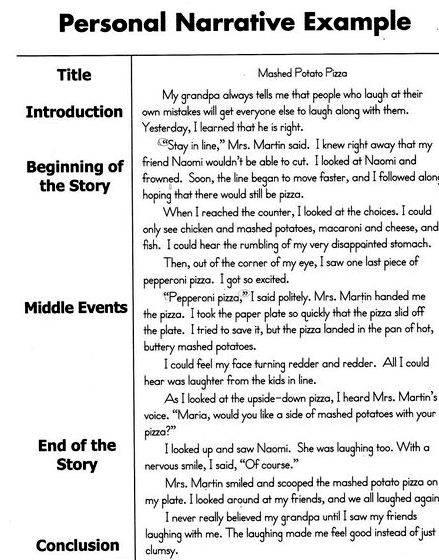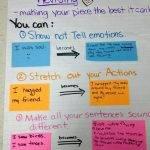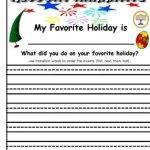Many creative writers use prompts to generate new material. Prompts can be challenges — for example, write a story using only one syllable words or craft an alphabet story where the first sentence begins with the letter A, the next sentence B, and so on — or themes provided by journals, or a poem to which an writer can respond.
For example, the Sun lists prompts and deadlines every issue. To see responses, check out Readers Write.
For a list of up-to-date journal prompts, deadlines, and contest information, see the Writing Program’s bulletin board in Jensen on the second floor.
Creative Writing Exercises
Compiled by Catherine Reid
Creative writing exercises, like any kind of warm-up routine before playing a sport or a musical instrument, help loosen up your imagination while honing your writing muscles. The goals of the prompts below: clear, lively writing that uses specific images, well-chosen verbs and precise nouns, that “shows, rather than tells,” and that avoids clichés.
Though the exercises are more fun done with two or more people, each can be done alone. A suggested format: Choose a prompt from the list below. Weigh a few possibilities. Then write without interruption for 12-15 minutes.
If, while writing, you’re at a loss for material, shift to another of the five senses (sight, sound, smell, touch, taste); or shift your perspective from high to low, from close to far away; or consider the journalist’s five questionswho, what, when, where, why.
1) Describe a “first” (first apartment, first kiss, first time driving a car, first lie, first big success, first roller coaster ride, first time in this setting).
Include as many details as possible, being sure to include an aspect relating to each of the five senses.
2) Describe a memorable event, positive or negative, and how it felt to you, but do not name the feeling. Instead, tell how it felt in your body (damp hands, metallic taste, tight throat, wobbly knees, etc.).
3) Create a story using words of one-syllable only, beginning with a phrase such as:
“The last time I saw her, she. ”
“From the back of the truck. ”
“On the night of the full moon. ”
“The one thing I know for sure”
4) Describe a significant place, allowing the details to reveal why the place matters. Describe it from a tree or rooftop or from a hawk’s point of view. Describe it from the height of a dog or a turtle.
5) Write the map to where you live. Start as close or as far from your home as you wish.
6) Describe a significant person (teacher, neighbor, mentor, coach, parent, sibling, sweetheart) with as many physical details as possible, but no clichés. (If you’ve heard the expression before, don’t use it.)
7) Write about your first namewhy you were given it, what associations or stories are attached to it, what you think or know it means. Do the same for your last name. Given the chance, what name would you give yourself?
8) Describe a presence in your house (childhood home/current place of residence)a person, a pet, a piece of furniture, an illness, a secret.
Use all five senses. Be as detailed as possible.
9) Recall a photograph from your life and describe it in a way that suggests (but doesn’t specifically name) why it matters. (Remember the creative writer’s adage, “Show, don’t tell.”) Describe what happened either just before or just after the photo was taken.
10) Choose a photograph from a published collection of black-and-whites, of humans in uncertain conditions. Write the story of one of the individuals or one of the groupings.
11) Narrate a story about a person or a family member, a story that’s been passed down or ritualized; a story about yourself. Embellish, if so desired, or contrast the story with what you know to be the “true” account.
12) Describe a routine or holiday ritual, using present tense verbs.
13) Describe a routine or holiday ritual, using the 2 nd person “you”:
For example, “You stand in the steaming kitchen with people you haven’t seen in almost a year. You wish your shirt didn’t have that tiny stain on the cuff. You wish your aunt’s laugh wasn’t quite so brittle. Feet stomp on the porch and you hurry to let your tall uncle in, forgetting to keep the dog from escaping outside”
14) Choose a moral dilemma (for example, you see someone pocket several items at a CVS; you’re in a car at night, with people you don’t know well, and the driver hits a dog that ran into the road; you learn that a friend is having unprotected sex, etc) and explain what you would do. More importantly, explain why you would do it. What do you know about yourself that accounts for such a decision?
15) Create a short story that is 26 sentences long, each sentence beginning with the next letter of the alphabet. (Add other, arbitrary conditions, if desired, such as one sentence should be one-word long; there should be one question mark, one quotation, etc.) Rigid rules often produce fascinating resultssuch as with well-written sonnets, which have 14 lines and tight rhyme schemes, each line governed by a specific number of syllables and alternating stressed and unstressed syllables.
16) Create a still-life in the room that implies a dramatic moment (e.g. an overturned chair, several balled-up pieces of paper, an open map, a torn envelope, a set of keys, a silk scarf). Describe what happened either just before or just after that moment.
17) Review a section from the Police Beat or Classified Ads of a local newspaper. Choose one and tell the story behind it.
18) Describe the room of one of the following: a high school student about to drop out; a cashier who has just won the lottery; a faded movie star who still thinks she’s famous; a paranoid person, etc (see full list of suggestions in What If? Writing Exercises for Fiction Writers ). Be as detailed as possible.
19) Create a how-to manual for something you can do well (clean a fish, change a flat tire, restring a guitar, make sushi, shop for groceries). Describe the process so that someone else could complete the task based on your directions. Use present tense verbs.
20) Come up with a list of nouns and a second list of verbs, all of one syllable each. Describe a scene or situation, using a minimum of ten words from each list.
All code by the Wilson Webmasters
1996-2016 Warren Wilson College
Admission: 1-800-934-3536
Switchboard: 828-298-3325






 Harris academy upper norwood banned words in writing
Harris academy upper norwood banned words in writing Reasons to revise your writing resource
Reasons to revise your writing resource Practice cursive writing your name
Practice cursive writing your name My favorite holiday writing prompts
My favorite holiday writing prompts Improve your writing skills by reading
Improve your writing skills by reading






